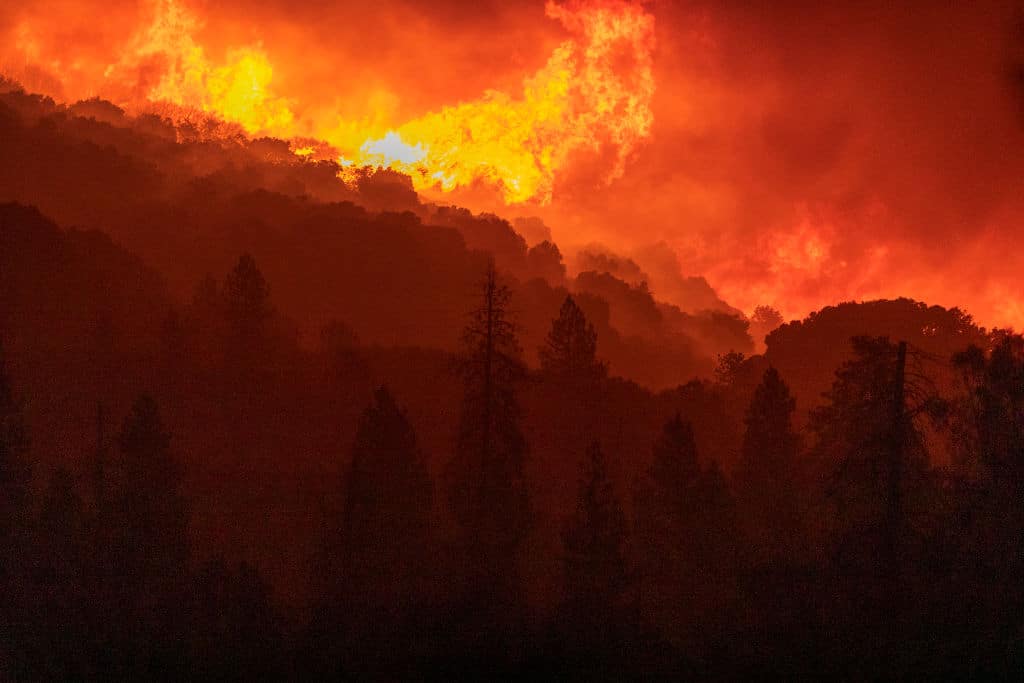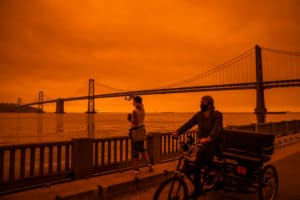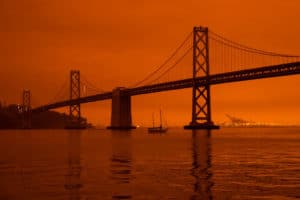
Ask anyone who lives in the Bay Area about the feeling of being engulfed in darkness during daylight hours with the flames of fires that have now claimed twelve lives and over 3,900 structures. Air from the Sierra Nevada mountains is pouring into San Francisco, casting a deep orange haze across the city, as well as much of the American west. Most days, the morning fog carries the smell of the lightning-sparked fires and the scent of millions of incinerated trees and buildings that have burned across California.
Because of these fires, air quality in California has gone down. In fact, several areas along the West Coast, air quality has degraded to the worst category: “hazardous.” For example, in Mendocino County, wildfires have made breathing the air like smoking 12 cigarettes in a day.
The closer you are to smoke — that is, the more smoke you inhale — the higher your risk. And the longer you’re exposed to smoke, the greater your risk of lung damage. You’re unlikely to be hurt by a quick dash to the grocery store. But people who work outdoors every day face bigger problems.
The smoke itself is a mixture of gases and particles like volatile organic compounds, carbon monoxide, soot, and ash. Right away, they can cause watery eyes and scratchy throats. But the biggest threats from smoke come from some of the tiniest particles, particularly those with a diameter smaller than 2.5 microns, known as PM2.5. These particles can penetrate deep into the airways, exacerbating heart and lung problems.

“Individuals with heart and lung conditions should be aware of the additional risk during smoky conditions as wildfire smoke can increase the potential risk for serious cardiovascular and cerebrovascular conditions, such as heart attack and stroke,” a spokesperson for the California Department of Public Health told Vox in an email. “These risks are especially significant among persons over the age of 65.”
COVID and California Smoke
Risk of infection with the COVID-19 virus is also elevated if you are close — within six feet — of an infected person, and inhale many viral particles. In hospitals, “exposure” is considered likely if you are close for 15 minutes or more.
To protect delicate lungs from both threats, medical experts are urging high-risk individuals to take extra precautions — such as staying home, closing windows, using an air purifier and wearing special masks when venturing outdoors.
“People should be sheltering in place as much as possible during bad air quality from wildfire smoke,” said Dr. John Balmes, UCSF professor of medicine in the divisions of occupational and environmental medicine and pulmonary and critical care.
What to do After a Wildfire
Wildfires leave behind a lot of ash pdf icon that can irritate your eyes, nose, or skin and cause coughing and other health effects.
According to the CDC, children, pregnant women, and people with asthma, Chronic Obstructive Pulmonary Disease (COPD), or heart disease need to be especially careful about breathing in dust from ash.
- Protect yourself against ash when you clean up. Wear gloves, long-sleeved shirts, long pants, and shoes and socks to protect your skin. Wear goggles to protect your eyes.
- Wash off any ash that gets on your skin or in your eyes or mouth as soon as you can.
Children should not do any cleanup work.
Limit how much ash you breathe in by wearing an N95 respirator. A respirator is a mask that fits tightly to your face to filter out ash before you can breathe it in. You must wear a respirator correctly pdf icon. Respirators are not made to fit children. If you have heart or lung disease ask your doctor if it is safe for you to wear a respirator.
Pay attention to any health symptoms if you or your children have asthma, COPD, heart disease, or are pregnant. Get to medical help if you need it.

Drive safely.
- Be alert for broken traffic lights and missing street signs.
- Watch out for trash and debris on the road.
- Learn more: Motor Vehicle Safety
- Be careful around damaged buildings or structures.
- Wait to return to buildings during daylight hours, when it is easier to avoid hazards, especially if the electricity is off and you have no lights.
- Learn more: Worker Safety During Fire Cleanup
- Clean up safely.
- Wear proper safety equipment, avoid carbon monoxide poisoning, and avoid electrical hazards.
Protect your emotional well-being.
After a wildfire, you may feel sad, mad, guilty, or numb. These are all normal reactions to stress. Talk to a psychologist, social worker, or professional counselor if you need help coping.








